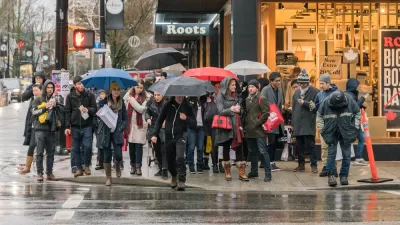It makes more fiscal sense to buy flood-prone land and conserve it than to cover the costs of the damages to developments, according to researchers from the University of Bristol and other institutions.

"Keeping vacant, flood-prone lands free of development could save taxpayers billions," writes Eli Chen, sharing the findings of new research published recently in the journal Nature Sustainability.
The study "found that every $1 spent acquiring undeveloped properties in the 100-year floodplain — which have a 1% chance of flooding in any given year — returns $5 that would be spent on emergency services, flood insurance claims and other flood damage costs if those properties became developed."
"As the number of people living in flood-prone regions like St. Louis is increasing, local governments should consider protecting undeveloped floodplain properties instead of building on them, said Barbara Charry, the floodplain and nature-based solutions strategy manager for the Nature Conservancy’s Missouri chapter."
To find solutions to the challenges of making that vision a reality, the Nature Conservancy is working with the Army Corps of Engineers "to develop a plan to improve floodplain management for the eight municipalities along the lower Meramec River," reports Chen.
Historic floods inundated the Mississippi River watershed during last year's rainy season.
FULL STORY: Cities Buying Empty Lots In Flood-Prone Areas Could Save Taxpayers Money, Study Claims

Planetizen Federal Action Tracker
A weekly monitor of how Trump’s orders and actions are impacting planners and planning in America.

Congressman Proposes Bill to Rename DC Metro “Trump Train”
The Make Autorail Great Again Act would withhold federal funding to the system until the Washington Metropolitan Area Transit Authority (WMATA), rebrands as the Washington Metropolitan Authority for Greater Access (WMAGA).

DARTSpace Platform Streamlines Dallas TOD Application Process
The Dallas transit agency hopes a shorter permitting timeline will boost transit-oriented development around rail stations.

San Francisco's School District Spent $105M To Build Affordable Housing for Teachers — And That's Just the Beginning
SFUSD joins a growing list of school districts using their land holdings to address housing affordability challenges faced by their own employees.

Car-Centric LA Suburb Looks to a Train-Oriented Future
City leaders in Rancho Cucamonga, the future western terminus of the Brightline West rail line to Las Vegas, want to reimagine the city as a transit-oriented, pedestrian-friendly community.

New Alaska Bitcoin Mine Would Burn as Much Energy as the State’s Largest Coal Plant
Fueled by “stranded” natural gas, the startup hopes to become the largest in the US, and to make Alaska an industry center.
Urban Design for Planners 1: Software Tools
This six-course series explores essential urban design concepts using open source software and equips planners with the tools they need to participate fully in the urban design process.
Planning for Universal Design
Learn the tools for implementing Universal Design in planning regulations.
Municipality of Princeton
Roanoke Valley-Alleghany Regional Commission
City of Mt Shasta
City of Camden Redevelopment Agency
City of Astoria
Transportation Research & Education Center (TREC) at Portland State University
US High Speed Rail Association
City of Camden Redevelopment Agency
Municipality of Princeton (NJ)




























